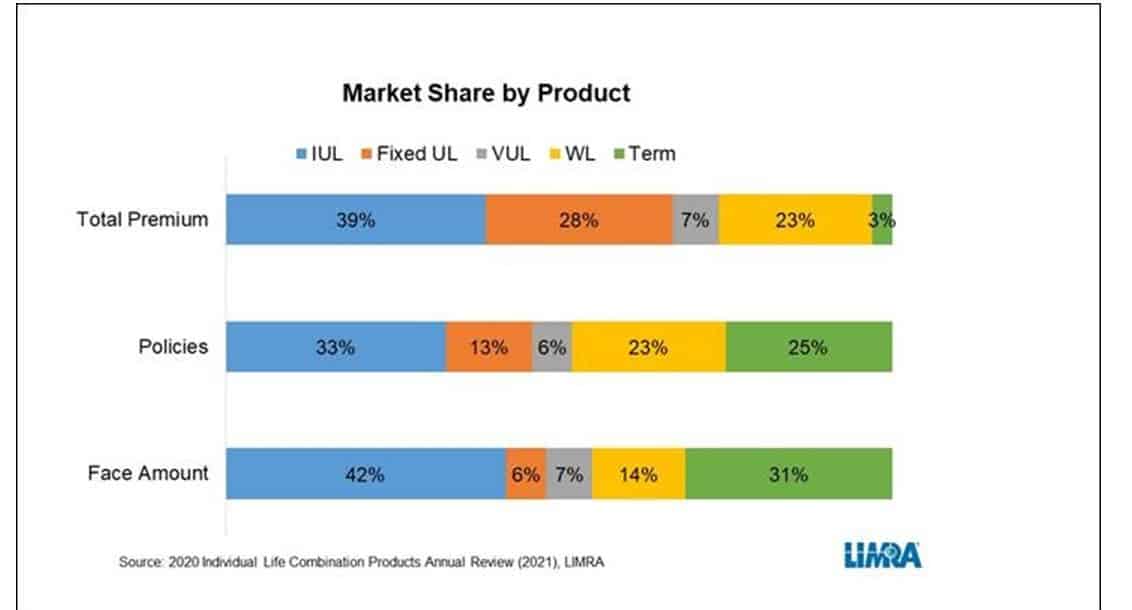Combo Life Product Sales Plummeted In 2020, LIMRA Reports

WINDSOR, Conn., Aug. 5, 2021 — After strong results in 2019, total new premium for individual life combination products decreased 23% to $3.7 billion in 2020, according to LIMRA’s 2020 U.S. Individual Life Combination Products Annual Review. There were approximately 421,000 policies sold in 2020, down 7% compared with 2019 results.
Life combination products provide life insurance coverage with long-term care or chronic illness coverage, an attractive value proposition to consumers, according to LIMRA consumer research.
“Two thirds of carriers reported decreases in total premium over 2019. The majority of this was driven by declines in single-premium long-term care (LTC) extension of benefit sales on universal life and whole life products,” said Austin Tewksbury, associate analyst, LIMRA Insurance Research. “Given the complexity of these products, we are not surprised that sales were more challenging during the pandemic.”
Recurring-premium products continued to grow market share in 2020. While sales of all product lines fell in 2020, single-premium declines were significantly greater, falling 41% for the year. Recurring premium slipped just 5% in 2020. Recurring-premium products’ market share increased 2 percentage points in 2020, representing 96% of the total number of life combination policies sold.
On a product level, whole life (WL) combination premium experienced the largest decrease in 2020, down 30%, compared with 2019 results. WL combination product sales lost 2 percentage points in market share. Variable universal life (VUL) combination premium decreased slightly, down 2% in 2020.
Universal life (UL) combination premium fell 23%, compared with prior year. UL combination premium continues to be the most popular, with 68% market share by premium. Term combination premium held 3% of the combination product market.
Chronic illness (CI) acceleration riders gained 8 percentage points of premium market share to exceed LTC extension products. As of 2020, CI acceleration riders represent more than two thirds of all combination product sales.
In spite of significant declines in sales in 2020, the independent agent channel retained its majority share of the life combination products market based on total premium (71%), policies (62%), and face amount (65%).
While life combination products fell in 2021, considerable consumer interest remains. A 2021 LIMRA study found more than 6 in 10 Americans would consider a life combination product and 26% were extremely likely to consider life combination products. Consumer concern about paying for long-term care services has risen 12% since 2019, to 37% in 2021.
The top reasons consumers give for considering a life combination product include:
- Concern that LTC costs may deplete or exceed savings
- It would be a more economical use of current assets
- Benefits would be paid even if they didn’t incur LTC expenses
- LTC insurance (on its own) is too expensive.
According to LIMRA data, nearly 4 in 10 Americans are worried about affording long-term care services if they become unable to take care of themselves. LIMRA estimates, however, that less than 10% of Americans own long-term care coverage.






First Catholic Slovak Ladies Association Is Now Known As FCSLA Life
Lincoln Gains Traction In 2Q With Indexed Variable Annuities
Advisor News
- SEC in ‘active and detailed’ settlement talks with accused scammer Tai Lopez
- Sketching out the golden years: new book tries to make retirement planning fun
- Most women say they are their household’s CFO, Allianz Life survey finds
- MassMutual reports strong 2025 results
- The silent retirement savings killer: Bridging the Medicare gap
More Advisor NewsAnnuity News
- Annexus and Americo Announce Strategic Partnership with Launch of Americo Benchmark Flex Fixed Indexed Annuity Suite
- Rethinking whether annuities are too late for older retirees
- Advising clients wanting to retire early: how annuities can bridge the gap
- F&G joins Voya’s annuity platform
- Regulators ponder how to tamp down annuity illustrations as high as 27%
More Annuity NewsHealth/Employee Benefits News
- Wellpoint taps Rachel Chinetti as president
- Proposed changes to MA and Part D would harm seniors’ coverage in 2027
- Pan-American Life Insurance Group Reports Record 2025 Results; Premiums Reached $1.86 Billion and Net Income Totaled $110 Million as Company Enters Its 115th Year
- LightSpun and Smile America Partners Announce Partnership to Accelerate Dental Provider Enrollment to Expand Treatment for 500K Underserved Kids
- Lawmakers try again to change ‘reflection in the mirror’ for cancer patients
More Health/Employee Benefits NewsLife Insurance News
- Annexus and Americo Announce Strategic Partnership with Launch of Americo Benchmark Flex Fixed Indexed Annuity Suite
- LIMRA: Individual life insurance new premium sets 2025 sales record
- How AI can drive and bridge the insurance skills gap
- Symetra Partners With Empathy to Offer Bereavement Support to Group Life Insurance Beneficiaries
- National Life Group Ranked Second by The Wall Street Journal in Best Whole Life Insurance Companies of 2026
More Life Insurance News